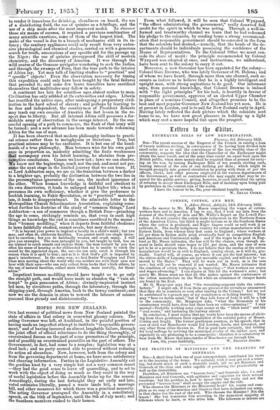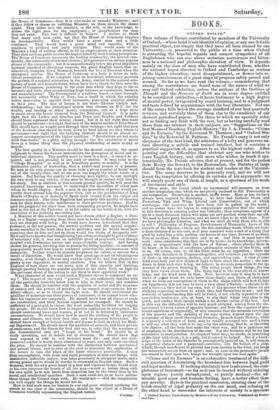THE TRAINING OF MINISTERS AND THE TRAINING OF GENERALS.
Sin—A short time back one of your correspondents contributed his views as to the training of the Army. We certainly wish it may get such a train- ing, but doubt much of such a desirable result, till we get Ministers and Generals of the class and order capable of perceiving the practicability as well as the desirability. Doubtless, all Ministers are "heaven-born," and Generals also, s. e. real Ministers and real Generals, with aptitudes and capacities for their several vocations : but the problem is, how to insure that the really and not the pretended "heaven-born" shall occupy the empire and the rule. Who chooses the Ministers or the Ministerial bend? for, repine and com- plain as we may at the mistakes and blunders that have decimated our army, in that choice lies the root of the evil. Who chooses the Minister? Not the Queen ! She but nominates him according to the numerical majority of followers whom he leads, or who drive him. The followers or drivers are
the House of Commons,—they it is who make or unmake Ministers; and if they follow or choose an unfitting Minister, on them should the shame alight. They either lack the intellect, or the will, or the knowledge, to Moose the right man for the emergency ; or peradventure the man does not exist. This last is difficult to believe. I incline to think that many such men exist, but that the House of Commons requires an incompatibility. They would have a great man and a little
combined. They would have a great mind and capacity, with a readiness to political and party intrigue. They would make of the Minister a kind of railway official, to fill up employments at their dictation. They shut out from public service the higher minds by their trading perceptions. The House of Commons represents the trading community, the monied com- munity, the community of selected electors ; it represents even certain popular phases of the community ; but it is unquestionably below the great impulsive national standard of chivalrous emprise, the great English heart, that in- stinctively tramplee down Mammon beneath the feet of Freedom when the emergency arrives. The House of Commons as a body is below its indi- vidual perceptions. If we complain that an hereditary aristocracy prevents the growth of a natural aristocracy in the Army, similar to the natural aris- tocracy of trade and manufactures, whom have we to thank for this, save the House of Commons, pandering to the class into which they hope to rise as baronets and lords, after accumulating huge fortunes as contractors, bankers, and manufacturers ? The Government is a railway board—a close borough, not necessarily either Whig or Tory, but a board in which the existing rulers manteuver to appoint their successors, possessing qualities similar to their own. The race of heroes is not dead—Thomas Carlyle not- withstanding; but but the stereotyped system that chooses an M.P. for his wealth, and trading or other money connexions, acts as a huge sieve to strain away the heroic 'element from the National Council. It is quite
-right that the Lockes and Geachea and Fetes and Brights and Cobdens should there represent their several classes ; but it is not right that trade should be paramount—not right that men of the mental calibre of John Stuart Mill should have no weight save through their writings—not right that men of the Roebuck class should be worn down by hard labour ere they attain to governance—not right that the bullying element should be an almost ne- cessary accompaniment of the higher qualities. "Revolutions are not made with rose-water," is a pithy saying enough ; but the revolution of moral force is a better thing than the physical overbearing of mere money or muscle.
The first quality in a Minister should be the mental capacity, the sound judgment to choose his human instruments, the perception of moral and in- tellectual character. This quality must be born in a man ; it cannot be ac- quired, and is not peculiar to any rank or station. It may exist in the village Hampden" as well as in hereditary gentry or nobility. It is the
instinctive quality of leadership, that a prince may possess or a: peasant. No man in his own person can do more than a given number of hours' work out of the twenty-lour, and no one man can supply the whole wants of a nation. But having the quality of choosing men rightly, he can multiply his own work to any extent, if the men be brought in contact with him for his study. But in addition to this natural general quality, he will need the acquired knowledge necessary to understand the specialties of other men whom he would employ. Such a man in the possession of power would na- turally draw around him the superior class, just as the peculiarities of King Bombe of Naples or of Isabella of .Spain draw around them the vulgar and common-minded. The elder Napoleon had precisely this quality of choosing men for their fitness, with indifference to their previous positions. Had he used his judgment for other than mere conquering purposes, he might have died in his bed at the Tuileries, or in his saddle on the battle-field, with the _conviction of his posterity succeeding him. A Minister of this calibre would not have chosen either a Raglan, a Dun- dee, or a Napier—supposing these three men to be the inefficientcommanders they are charged with being. He would have known beforehand that they possessed, or did not possess, the mental qualities and the special acquire- ments essential to the work they had to perform ; and he would have been conscious that on him and not on them would the blame of incapacity rest. He would have known that though being born a Somerset might be good evidence
a hereditary will, it was not an infallible proof of judgment, even though coupled with Peninsular service and unquestionable courage. And having chosen his general, knowing him to possess the fitting qualities, no amount of unpopularity would lead him to confound unfavourable circumstances with , incapacity. Neither would he mistake roughness for valour, or success for a result of discretion. He would know that great age is not an advantageous quality, even though a Nestor may exist in spite of it ; and that physical Ca- pacityis one ingredient in mental exertion. Can we believe that in this England of ours there are not many men of this capacity and training, though possibly lacking the popular qualities to set them forth on high for the universal shout of the nation to call them to their appointed work ? What character of man would such a Minister choose to command an ar- my ? The import of the word " general " is, one sufficiently familiar with .W.1 the particular branches below him to take in their scope and combine them. He should be familiar with the qualities of metal and the structure
of cannon and the powers of powder, or he cannot close-examine his ar- tillery-officers, so as to choose the right men. He should understand the qualities of materials and their powers of resistance, or he cannot know whe- ther his engineers are competent. lie should know how all classes of roads are constructed, and their various capacities for transport. He should be sufficient of a geologist to choose the least unhealthy localities for lodging his people. He should know how to improvise appliances on emergency. Ho should understand times and seasons, so as not to be defeated by unforeseen , circumstances. He should know how to assort the clothing of his people to ' season and climate, and their food also, and be prepared beforehand. He should know enough of human health and disease to hold in cheek his Medi- cal Department. He should know the qualities of animals, and their powers of endurance and the fitness for food and use, in order that the members of the Commislariat may not "laugh at his beard." He should be of ready invention, not at details but in direction. Re should know that men exposed to cold in wet trenches must die ; and that one well- preserved soldier is worth three abandoned to want, and only costs one-third .the price, lie should be familiar with the distinction between mechanical and animal labour, and be ever on the alert to stimulate the application of the former to take the place of the latter wherever practicable. A man this accomplished, with acute and rapid perception of men and things with instinctive inflexible justice, true large generosity to recognize merit, and a strong genial spirit, would be worthy to commandan English army. Such a General, with his own great heart in a firm and vigorous frame, would draw to his own purposes the hearts of all his men—would so imbue them with his own spirit as to win lands from despotism less by the sword than by his moral and intellectual qualities. Such a man could not do or leave undone those things the Crimea rings with. He would not—But the imagination can well supply the things he would not do. How to find such inen for leaders in ease and posse without confining the search to one class of the community, should be the object of a House of Commons worthily representing the English nation. Cosmos.



























 Previous page
Previous page